Ms. Perry Chiu, who was invited by the Diligentia College on April 7th, 2017, shared her insights on stage performance from the perspective of The Golden Cangue and its female roles created by Eileen Chang. With Eileen Chang as its author, Wang Anyi its playwright, Ann Hui its director and Perry Chiu its leading actress, The Golden Cangue is indeed a play of four women. It has stunned its audience since its premiere in 2009, who were deeply impressed by Perry Chiu’s glamorous performance and acclaimed it as the best production ever.
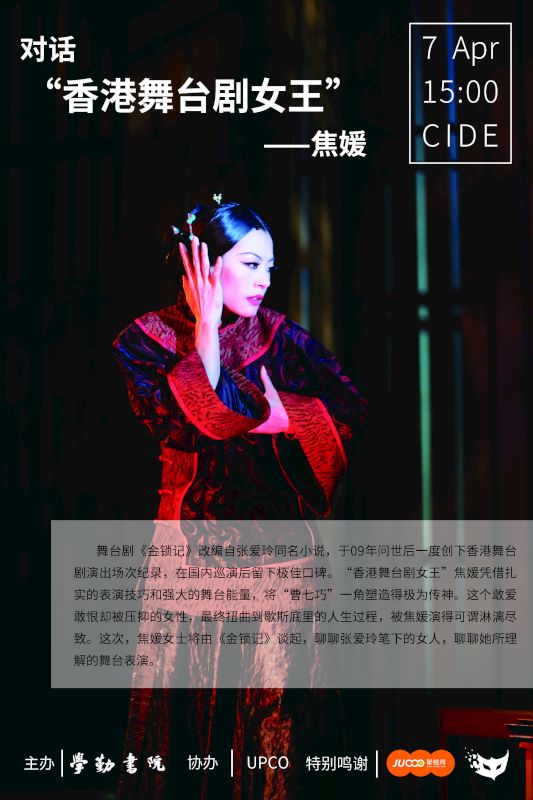
The Golden Cangue: A Tale of Two Cities of Four Women
In the opening session, Dr. Zheng Lin gave a brief introduction on the four women creators to prepare the audience into the play’s world. The play’s writer, Wang Anyi, is the most representative author of the second generation of Shanghai-School after Eileen Chang, and a “new successor to the Shanghai School” by David Der-wei Wang. Ann Hui, the famed Hong Kong director of Love in a Fallen City and Eighteen Springs, is also deeply connected to Eileen Chang. Together with Perry Chiu who closely follows female topics, all the connections make perfect sense. The chemistry between the four “legendary ladies” generated in this play not only embodied the harm watch, harm catch image of Tsao Chi-chiao, heroine of this play, who chose to fight the grim reality in a way so abnormal that she was trapped with a twisted personality within a cangue of money, but also the culture collision of two cities. Just as professor Leo Ou-fan Lee once commented that Hong Kong could be viewed as “the other” for Shanghai, a coincidence unfolds itself in the fact that the two writers for the play, Eilleen Chang and Wang Anyi, are from Shanghai, while the two presenters, Ann Hui and Perry Chiu, are from Hong Kong.
The novella The Golden Cangue is about a woman living in old Shanghai in the early 1800s. Compared with the play version presented by Shanghai Dramatic Arts Centre which struck few responsive chords, why the Hong Kong’ s version with the same playwright won audience’s good graces? Great books and plays always afford much food for thought. The extended knowledge of background and geography before the lecture would help us think and feel more deeply about The Golden Cangue. So far, however, we seem to approach the story in the third-person point of view. Next, comes the “first-person perspective” of interpretation by Ms. Perry Chiu, the one who really got involved in the story and “lived” the whole life of Chi-chiao.
The Golden Cangue: A Lock of Heart, the Cure for Heart
What does The Golden Cangue denote? For Tsao Chi-Chiao, her desires for money, power and lust all form a golden cangue, clinching her heart and depriving her of freedom for life. The above interpretation, which most readers familiar with the story would have in their mind, was exactly what Ms. Perry Chiu tried to convey in her initial performance. Is “the golden cangue”, however, only to be found in poor Chi-chiao? In fact, there was also a cangue inside Perry Chiu locking her heart with the stage until 2015.
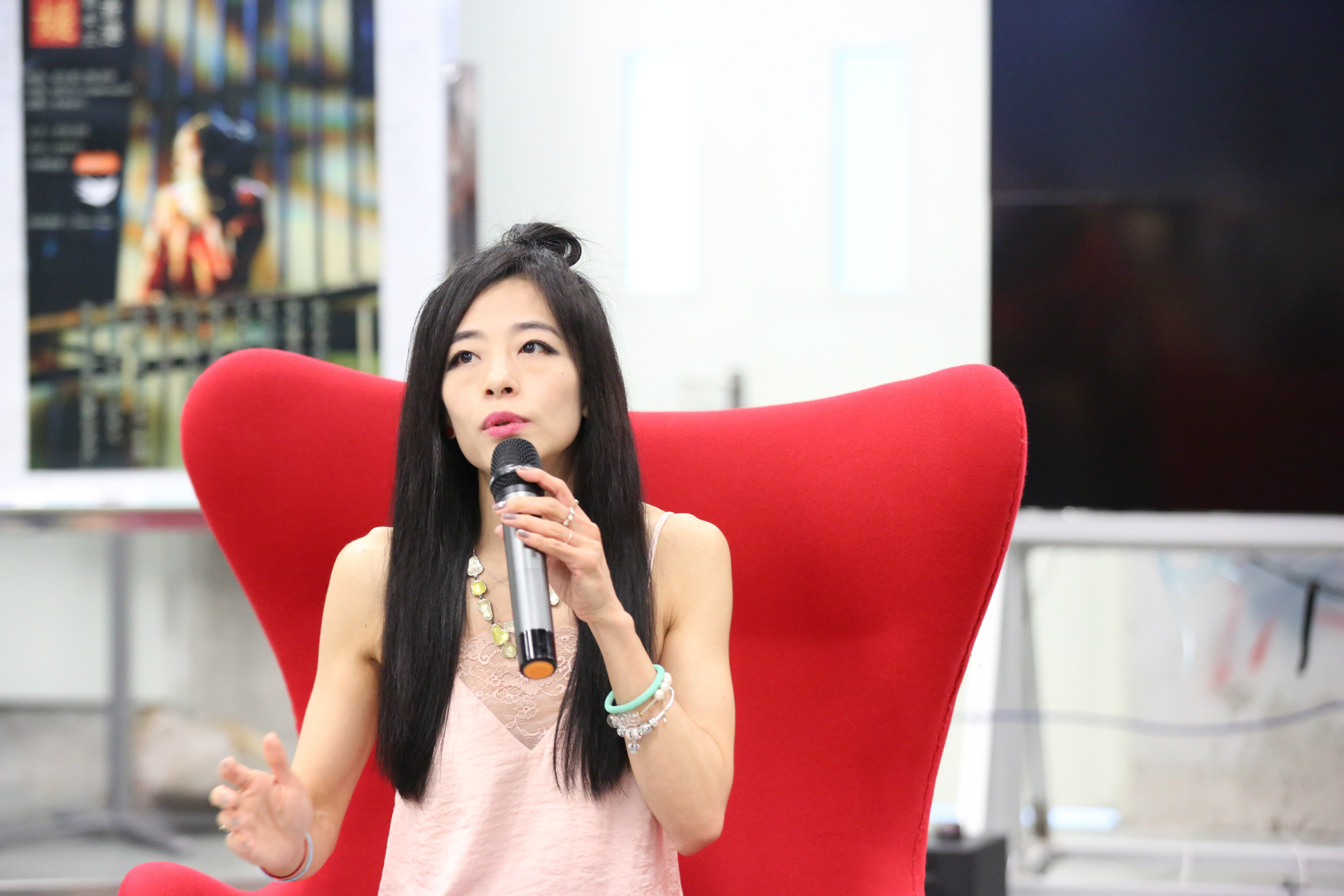 In Perry Chiu’s childhood, her father’s unappreciated career as a Beijing Opera actor stimulated in her a strong desire to win credits for him and make a splash on the stage of Hong Kong, to inherit his stage art. It was her father’s suffering of unfair treatment that served as a cangue for her performance career. Then his passing rendered her performance under tension and inhibitions and brought her a feeling of losing the very key to her cangue, a lock that stage performance can no longer unlock.
In Perry Chiu’s childhood, her father’s unappreciated career as a Beijing Opera actor stimulated in her a strong desire to win credits for him and make a splash on the stage of Hong Kong, to inherit his stage art. It was her father’s suffering of unfair treatment that served as a cangue for her performance career. Then his passing rendered her performance under tension and inhibitions and brought her a feeling of losing the very key to her cangue, a lock that stage performance can no longer unlock.
Over the year of 2015, Perry Chiu gained new reflection when she reproduced the play, not only on Chi-Chiao but also on her locked self in reality: each of us holds a “cangue” in our heart, and we put it on ourselves. Just as Perry Chiu’s father put no pressure on her about her drama career, the cangue is put on by ourselves due to our personality, desire, and obsession. During the year, after combing the connections among “golden cangue”, Eileen Chang and herself, Perry Chiu found the cure in the book and freed herself from her “cangue”. “What is locking the stage and me is not the cangue, but the result I wish to deliver.” Each of us holds a cangue in our heart whose existence and origin can only be felt and discovered by ourselves.
 Perry sets a good model for actors. When she once again went through the role, she attributed the life-long discontentment of Chi-chiao to a stumbling hurdle that she in her heart simply can’t get over. Unfortunately, no one ever told her any cause and solution of this hurdle, so she had no choice but to pity herself in darkness and lived a miserable life.
Perry sets a good model for actors. When she once again went through the role, she attributed the life-long discontentment of Chi-chiao to a stumbling hurdle that she in her heart simply can’t get over. Unfortunately, no one ever told her any cause and solution of this hurdle, so she had no choice but to pity herself in darkness and lived a miserable life.
Sometimes the transition between pain and freedom is instantaneous. Some pain in life is of our own making by putting unaffordable cangue on ourselves. Therefore, unlocking freedom lies in tracing back to the cangue’s origin through constant reflection. This is the illumination what Perry Chiu obtained from the story and the light she passed to us.

Perry Chiu—A Real Performer Should Be Like Her
After Perry’s sharing, the audience raised several questions about self-culturingand refinement of “performers” in light of her identity as “Hong Kong’s Queen of Drama”.
Q&A
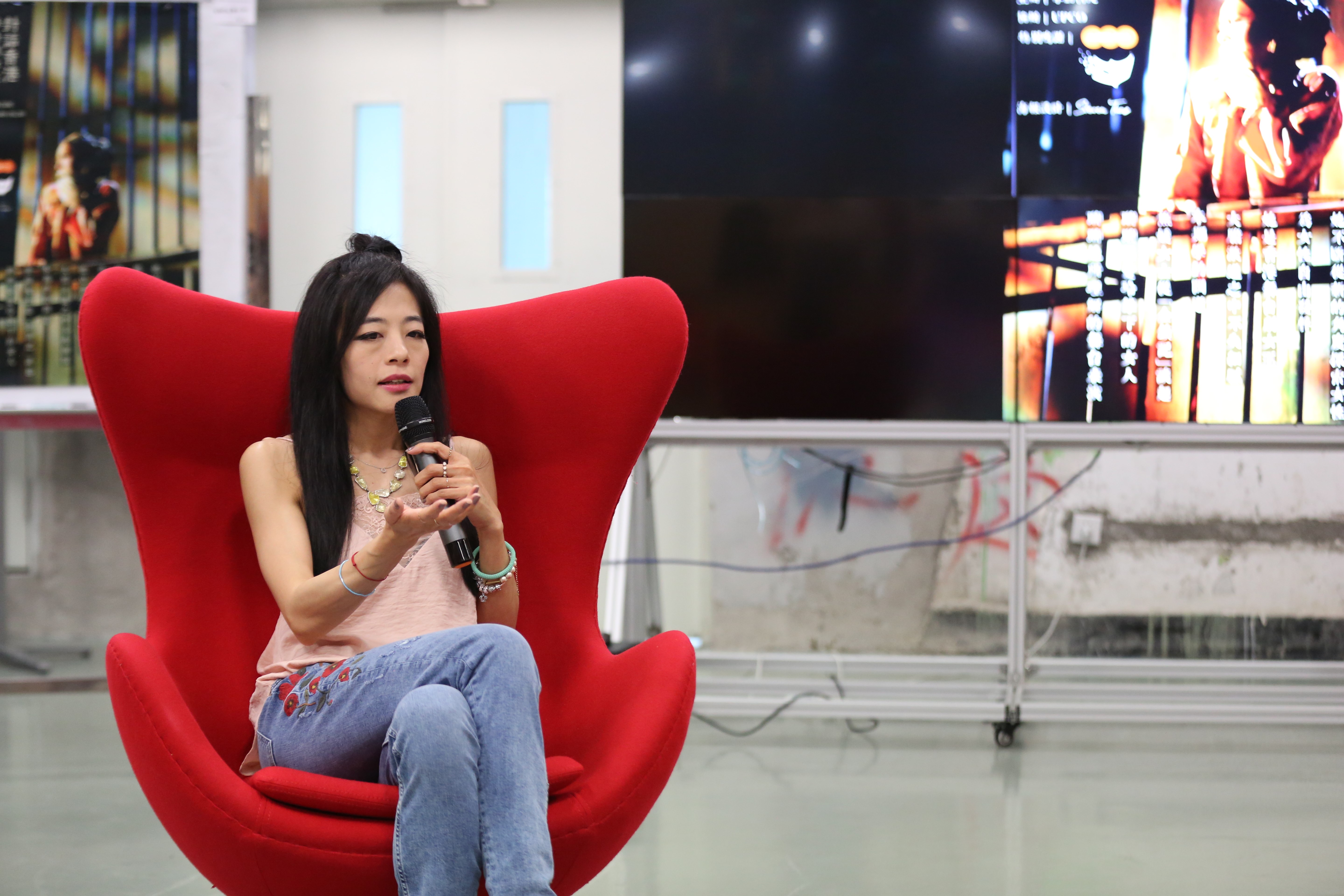 1、How do you view the label that the society puts on you?
1、How do you view the label that the society puts on you?
——Personally, I want to be label-free, but the media often defines me with certain words, which are generally based on the persona I present. Anyway, “Being labeled”, in some sense, means the success of my performance, which could be a good thing. So, for me, fixed labels on myself is against my wish, but I won’t object to labeling characters. At the end of the day, I don’t want to be limited with fixed labels.
 2、As stage performers, do you need to create certain images like movie stars?
2、As stage performers, do you need to create certain images like movie stars?
——Things are different for stage performers and TV series stars. Those stars need to consider their positioning outside the confines of screens. For example, they may have certain concerns over their acting in a TV show in order to maintain the image of “goddess”. As stage performers, however, we are free from such burden, because we only exist for the presentation of the very disparities among characters and it is our ceaseless endeavor to bring to stage the lives of a play in all their truthfulness. So, we are destined to keep no prominent self-image in our performance career.
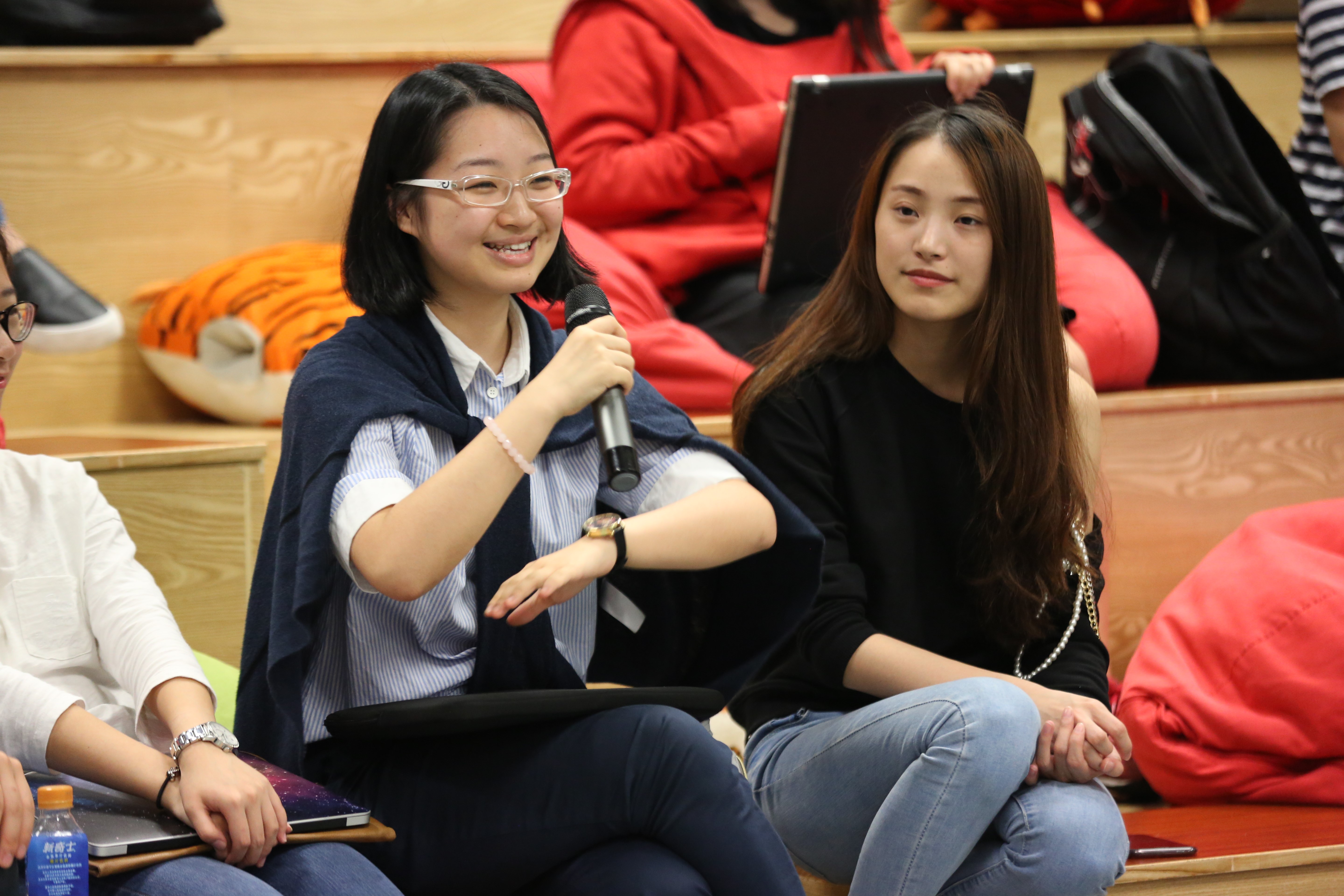 3、How do you view other’s comments on you?
3、How do you view other’s comments on you?
——There can be no such thing as absolute right and wrong, good and evil in terms of performance. Everyone’s comprehension of characters is subjective, vulnerable to their surrounding environment and own background. As various constructions bring diverse performances, audience’s judgement is based on their perceptual thinking without adequate objectivity. Therefore, in art industry where the absolute doesn’t exist, we could listen to others’ comments, but there should be no need of bother or accept-it-all, otherwise, our interpretation of persona would be affected and confidence hurt. So, you should be open-minded to comments, but meanwhile not too fussy about them.
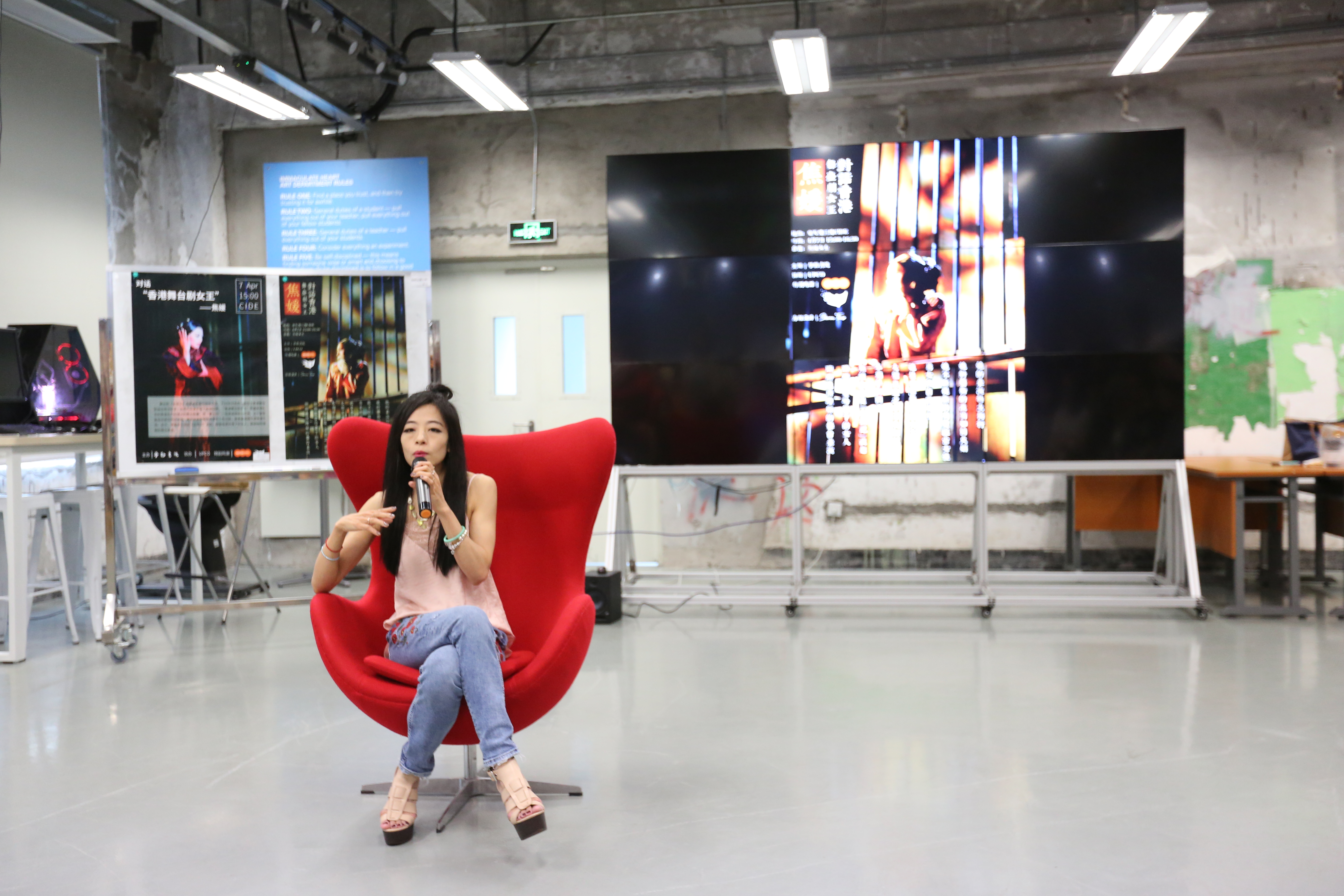 4、What attitude toward performance should a successful performer hold?
4、What attitude toward performance should a successful performer hold?
——As I see it, the most necessary quality for a successful performer is to treat acting as his own life. Because performance requires constant thinking and analysis in order to be better role-in, as well as to correlate scripts and methods of acting to daily life. So, the state of craze is essential to actors. Besides, we have to expand our artistic skills, such as singing, dancing, and drawing. Different from emphasis on facial subtleties in TV series’ close-ups, body language is the form of expression that matters in stage plays. Since the audience always seek for what they want on the stage, we have to extend the range of our makings and skills in an effort to present better. It is very important for an actor to reach a state where he mulls over acting crazily and values it as his own life.
 5、What kind of state of mind on stage could help deliver perfect results?
5、What kind of state of mind on stage could help deliver perfect results?
———Stage performance is not about exaggerated movements, but the release of inner emotions. “the true, the good and the beautiful” is the guiding principle of stage performance, among which “the true” is paramount. Sometimes you see exaggerated movements highlighting certain feature of the character, but it’s worth to notice that these movements are not made on purpose, but the natural flow of heartfelt emotions. Therefore, to make our performance more natural, what we really need is to enrich our feelings and make them more powerful, and fully devoted to the character, which in this way could be conveyed to the audience’s heart.
Comments
2016 SME Pingyu Hu
Off with the red costume and bright make-up, and away from the limelight, stands in front of us a living woman of wisdom and story—Perry Chiu. An actress with the eloquence no less than the man of letters, she talked confidently on our questions without distance or stiffness. We see a rational, crystal-eye woman without a tinge of condescension, drastically different from the desire possessed character Tsao Chi-chiao on stage. Such sharp contrast illustrates her refinement as an actress professionalism. Her talking made me think that maybe It is the making of fate that she is born to belong on stage.
To begin with, the event was unfolded on the theme of The Golden Cangue. Later on, our discussion went beyond the play to how to understand dramas, actors, literature, and most importantly, art and life. Though I haven’t seen the play, to give a pure conjecture, the greatly different feedbacks toward the two versions of Perry and Shanghai theatre could be attributed to actors per se. Ms. Chiu said that she got deeper insights on the “golden cangue” two years after the premiere, and what Eileen Chang did may not just be the narration of time story, but conveying the idea that each of us carries a “golden cangue” deep down inside, which is forced on ourselves and makes us distorted beyond recognition in our struggling. In addition, Ms. Chiu didn’t shy away from talking about her utilitarian thoughts during her early stage experience, the mere wish to pursue her father’s unfulfilled dream, a dream that no amount of hard work could realize and rendered her in high pressure every time she went on stage. Then, after rereading the book, it struck her that there was no need to be like that and she could choose to be more at ease with the stage. It was under the circumstances that she had buried the hatchet with her life that went her second play of Chi-chiao. I think her deeper understanding toward humanity helps produce more natural and smoother performance. Age-old wisdom renders her extraordinarily calm, affable, and tender in the presence of the young audience. She also offered us a brand-new angle to drama comprehension. In fact, many people’ s poor understanding or dislike of drama may be due to their thought: “Oh, the story’s so cruel!”, or a likely comment on The Golden Cangue: “Terrible, it makes me feel bad”. On the contrary, what Perry got after reading the scripts were strong emotions and a feeling of profound relief, because she went through the philosophy of scripts with contemplation instead of immersing herself in plots. It’s such attitude that needs to be found in the appreciation of many avant-garde dramas of the day.
Moreover, we discussed the difference among drama, movie and TV series. The Observant and conscientious audience may have found that Ms. Chiu has ever been/played on big screen, but she told us straightforwardly that she preferred the theatre which was more of pure and of tradition where performers played in peace and use no flamboyant embellishment to catch audience’s eyes. She put forward the phrase of “aroma of art”, which only exists in arts that are handmade, unique and irreproducible, away from the interference of industry-era machines. For TV series and movies, which, once finished, are available for unlimited downloads, copies and dissemination, the audience may feel little aroma in them over time. Drama, however, is another story. It’s the art whose audience is willing to pay for hundreds-worth tickets, the interaction with actors most intimate and every bit of emotional release irreversible. In drama’s world, there are no two identical productions. That’s why some of them worth repeated production and appreciation. Taking Phantom of the Opera as an example, we have been familiar with its plots over past years but are still willing to pay for it again and again, because we pursuit the aroma of art. On stage, Ms. Chiu outshines like a rose in full blossom, while offstage she is like a quietly closed book, that only by turning its leaves and listening her stories will your understanding of her beauty goes beyond the superficial level.
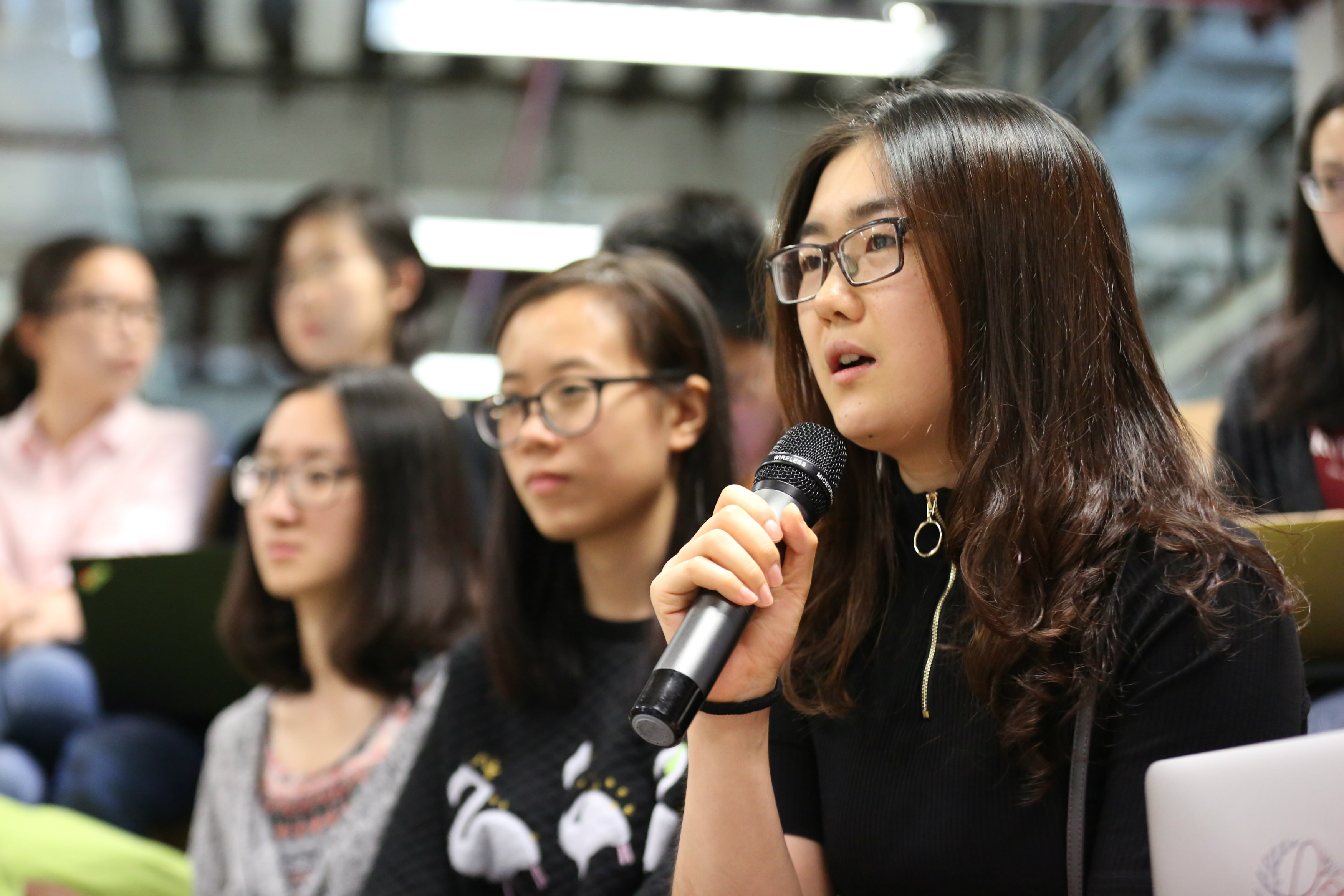 ▲Teachers and students asking questions
▲Teachers and students asking questions
2014 SME Weiyu Wang
The first sight of Ms. Chiu impressed me with her distinguished aura of elegance, and her sharing and responses revealed her conscientiousness and patience, different from my imagination of an avant-garde female as those in The Golden Cangue and The Vagina Monologues. We could easily tell from her narration that she is a very dedicated drama performer with pure pursuit of art.
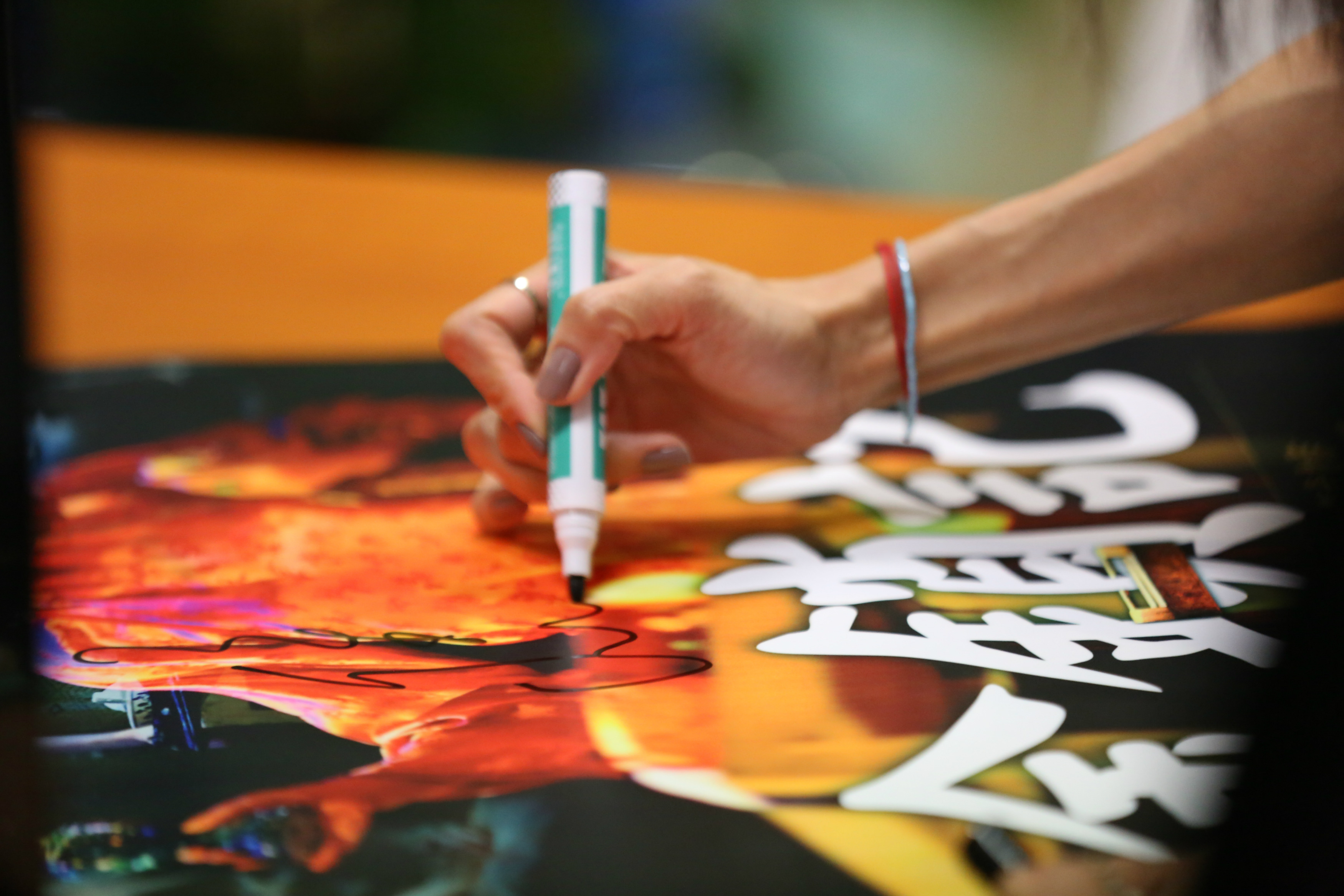 ▲ Ms. Perry Chiu sends her signed poster
▲ Ms. Perry Chiu sends her signed poster
2016 SSE Wenjing Ji
When asked “how do you interpret characters you play from the first and third-person perspective”, she answered “to be honest, I’d never think like that. When I play a role, I’m totally into her. I’m not playing her, but for that period, exactly herself.” Maybe this is the most impressive episode for me during the sharing event. On stage, her expressive performance is formed of all kinds of emotions; Off stage, she is gentle, quiet, wise, and calm, without a trace of those aggressive and sharp roles she plays. Maybe it was until meeting her did I really know what “great performer” is like. On stage and off are divided by curtains two totally different worlds. On stage, there’s no Perry, but only Tsao Chi-chiao, Jill, and Danlin Wang, etc.; off stage, there’s only Perry gently talking about her insights into the stage, play and life. The state of being fully devoted to the two worlds while maintaining cool-minded may be the highest plane of actors. Her meticulous and adorable narration rendered my initial recognition to great reverence. “I treat the stage and performance as my own life”, said Ms. Chiu. Simple words granted us great pleasure to have a glance at the artist’s wonderful theatre life.
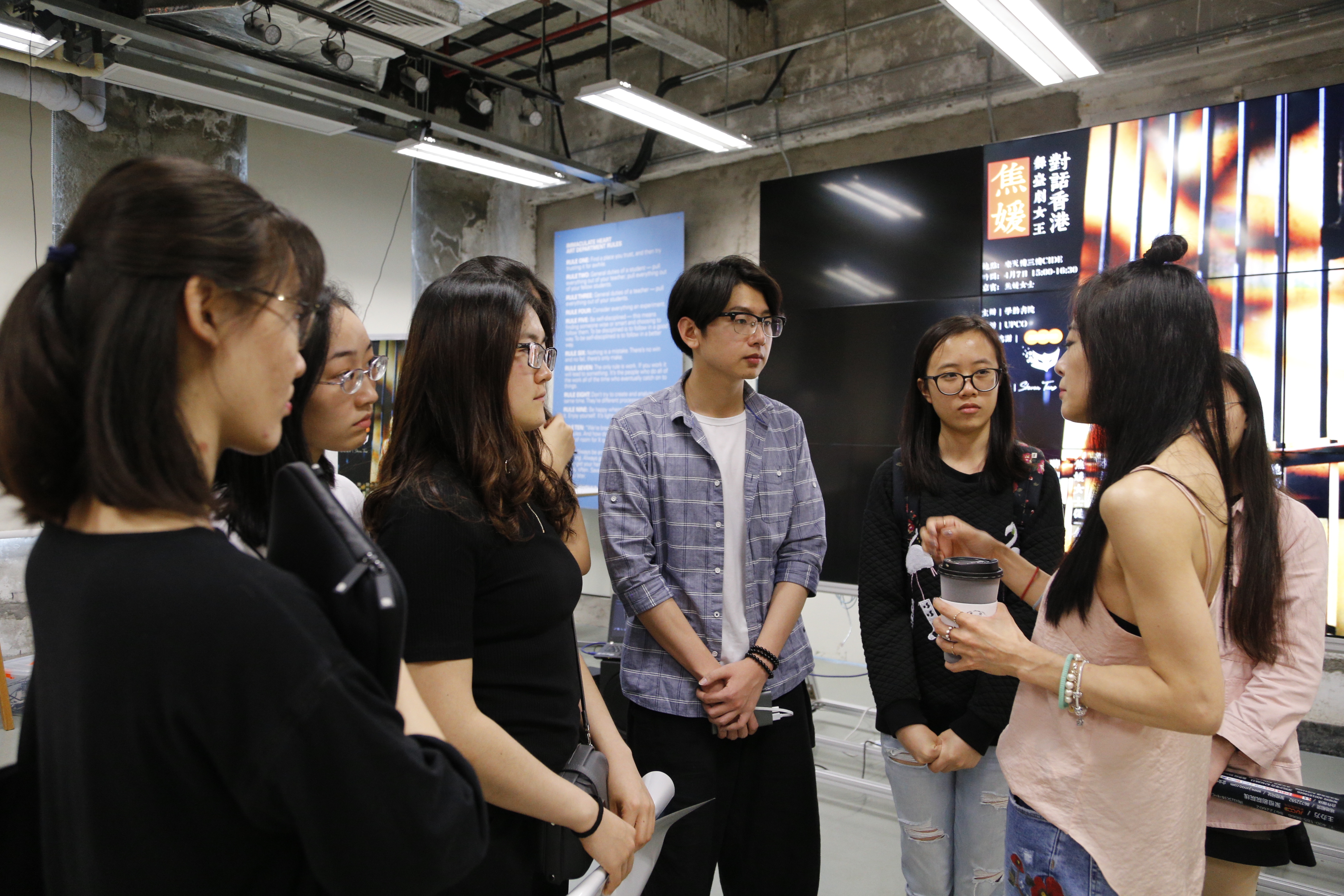 ▲ Ms. Perry Chiu interacts with theatre lovers afterwards
▲ Ms. Perry Chiu interacts with theatre lovers afterwards
Notes
Life and drama mirror each other. Each play has a central theme that it wishes to present in front of people. By animating their characters on stage, actors have become the mirror that reflects all walks of life, be it ugly or miserable. And every role is like a doctor who heals the ups and downs of our life. We try to identify us with what we watch on stage and begin our thinking about life inspired by scripts. Maybe this is the way that Ms. chiu wishes to lead us on with her sharing during this episode of Diligentia et Sapientia.

 In Perry Chiu’s childhood, her father’s unappreciated career as a Beijing Opera actor stimulated in her a strong desire to win credits for him and make a splash on the stage of Hong Kong, to inherit his stage art. It was her father’s suffering of unfair treatment that served as a cangue for her performance career. Then his passing rendered her performance under tension and inhibitions and brought her a feeling of losing the very key to her cangue, a lock that stage performance can no longer unlock.
In Perry Chiu’s childhood, her father’s unappreciated career as a Beijing Opera actor stimulated in her a strong desire to win credits for him and make a splash on the stage of Hong Kong, to inherit his stage art. It was her father’s suffering of unfair treatment that served as a cangue for her performance career. Then his passing rendered her performance under tension and inhibitions and brought her a feeling of losing the very key to her cangue, a lock that stage performance can no longer unlock. Perry sets a good model for actors. When she once again went through the role, she attributed the life-long discontentment of Chi-chiao to a stumbling hurdle that she in her heart simply can’t get over. Unfortunately, no one ever told her any cause and solution of this hurdle, so she had no choice but to pity herself in darkness and lived a miserable life.
Perry sets a good model for actors. When she once again went through the role, she attributed the life-long discontentment of Chi-chiao to a stumbling hurdle that she in her heart simply can’t get over. Unfortunately, no one ever told her any cause and solution of this hurdle, so she had no choice but to pity herself in darkness and lived a miserable life.
 1、How do you view the label that the society puts on you?
1、How do you view the label that the society puts on you? 2、As stage performers, do you need to create certain images like movie stars?
2、As stage performers, do you need to create certain images like movie stars? 3、How do you view other’s comments on you?
3、How do you view other’s comments on you? 4、What attitude toward performance should a successful performer hold?
4、What attitude toward performance should a successful performer hold? 5、What kind of state of mind on stage could help deliver perfect results?
5、What kind of state of mind on stage could help deliver perfect results? ▲Teachers and students asking questions
▲Teachers and students asking questions ▲ Ms. Perry Chiu sends her signed poster
▲ Ms. Perry Chiu sends her signed poster ▲ Ms. Perry Chiu interacts with theatre lovers afterwards
▲ Ms. Perry Chiu interacts with theatre lovers afterwards